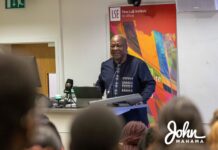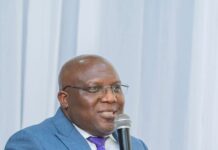
The Coalition of Domestic Election Observers (CODEO) has ripped Ghana’s media landscape to shreds, saying it is bereft of unity and so money-grabbing that those who jump to the defence of the press when oppressed only end up being embarrassed by the same fourth estate.
These two shortcomings, according to CODEO, have made the country’s media terrain unattractive to individuals and organisations who recognise the importance of the media and are prepared not only to champion their freedoms but also to defend their rights.
CODEO registered this concern at a news conference it convened to wrap up a stakeholders’ forum organised in Bolgatanga, the Upper East regional capital, on the disturbing trend of political party vigilantism in the country.
“What we’ve seen about you media guys, excuse me with all respect, please, you are money-conscious. Sometimes, when somebody is pushing for you, before you realise, they’ve gone back to take money and you the person who is leading the crusade become stupid, to say. You realised your colleague in the Baffour Gyan case. Before we realised, he’s taken money. So, some of us who were pushing became like laughingstock.
“Then, the guy who was molested by Sam George. Really, we are not clear, but the way the guy [recoiled] seemed to me that something went underground. A pastor, Obinim, entered a radio house, destroyed so many things. We issued statements. Coalitions of media in Accra packed the radio stations, started to [demand] that this pastor should be prosecuted. Secretly they went and took money,” asserted the Senior Programme Officer for CODEO, Nana Kwabena Aborampah Mensah.
Continuing, he punched with words: “You can’t do away with the media, but some of your colleagues, your professional character is questionable. It’s a critical issue we need to talk about. It’s a sacrificial job you are doing just like some of us in the civil society organisations. But you also need to start the crusade yourselves. And [another] aspect is division amongst you. Because of the bribery aspect, whilst you realise your friend, your colleague in the same profession, is being maltreated, somebody would stand on other radio stations and support [the persecutors]. That’s how the media is used in the country.”
CODEO wants political party vigilante groups outlawed
The news conference, forerun by a CODEO meeting with some executives of the country’s political parties and leaders of some party vigilante groups, saw the CODEO leadership call for a ban of all political party vigilante groups in Ghana.
“The existence of political party vigilante groups is illegal and the Ghana Police Service should ban and disband these groups immediately as a matter of national security. The leadership of the NPP and the NDC who are largely responsible for the emergence of these groups in the 4th Republic should own up to their responsibilities and work together with the police to disband all politically affiliated vigilante groups.
“In the long term, there should be a concerted effort amongst key election stakeholders to make the Inspector General of Police independent by insulating him or her from political interference by securing his or her tenure across regimes and ensuring such appointments are transparent and consultative,” demanded a statement jointly presented by Sheikh Armiyaw Shaibu, a CODEO Advisory Board member, and Albert Kofi Arhin, CODEO National Coordinator.
17 crucial views expressed by stakeholders
The meeting CODEO held with the stakeholders was funded by the United States Agency for International Development (USAID) and it was meant to collate views from participants on the trend of political party vigilantism “to develop comprehensive policy recommendations for stakeholders and relevant institutions to implement.”
CODEO’s press statement highlights 17 key viewpoints raised by participants in that meeting. They include: complaints of security biases and mistrust; the belief that the security agencies are not adequately resourced to deal effectively with criminal activities, particularly those committed by the party vigilante groups; claims that the police are not independent enough and do treat ruling parties and their supporters preferentially; a concern that political parties endorse the vigilante groups in private but hypocritically deny them in public and a report of perceived insecurity fuelling the formation of more vigilante groups in the region.
“There are virtually no sanctions applied to vigilante groups when they commit crimes against members of opposition parties, but a few of the criminal acts are punished when vigilante groups attack members of their own political parties. Some powerful individuals within political parties secretly form their own vigilante groups to champion their personal interests. Within the same political parties, some of the leaders expressed fear of the activities of vigilante groups against their own party executives and members.
“Motivation of their actions is mostly based on expected rewards from the party when they win political power. Vigilante groups, therefore, tie their fortunes to that of their political parties. There was strong perception that governments manipulate the security agencies in terms of appointments, promotions and transfers for their political interest,” the statement underscored.
Citing the participants’ views further, the statement points out that: “There is lack of effective mechanisms to regulate the conduct and the activities of even known and registered political party youth groups. Economic hardships and unemployment was identified as a major cause of the proliferation of vigilante groups in the region. It came out that the vigilante groups are aware of the illegal nature of some of their conducts and activities, but they are emboldened to do it because they are assured of protection from their political leadership.”
Concluding, the statement says: “Political parties infiltrate the recruitment of temporary staff of the Electoral Commission and this breeds mistrust and perceived corruption in the electoral process. There is ineffective logistical arrangement by the Electoral Commission with regard to distribution and collection of electoral materials after polls. The public has not been very critical in condemning the conduct and activities of political parties, vigilante groups and other election stakeholders when they violate the electoral rules. There was strong expression of lack of effective civic and voter education in the region.”
To stem the rising tide of political party vigilantism in the country, participants proposed the provision of employable skills for the youth, unbiased application of the law and the Parties’ Code of Conduct against all criminal offences as well as public education through the media about the dangers of the existence of such groups among other recommendations.




